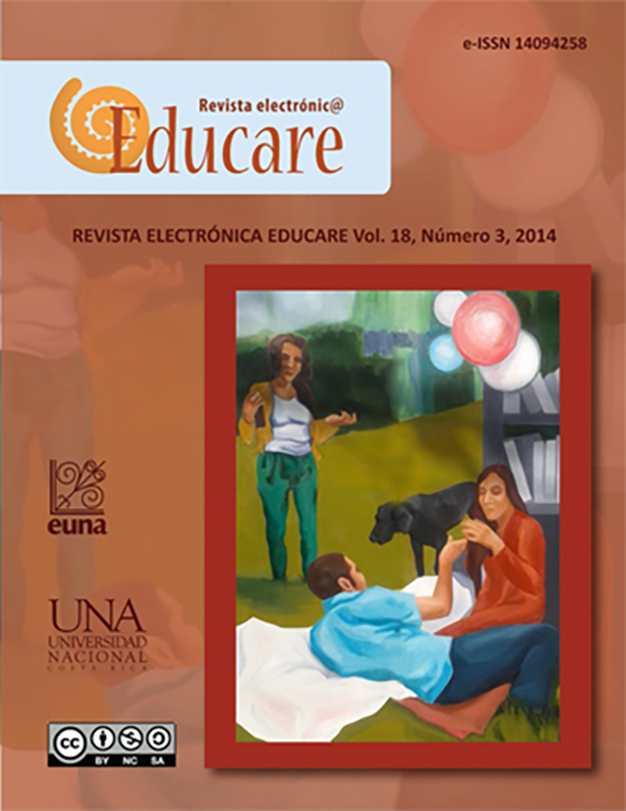The Use of Conflict in Teaching the Arts
DOI:
https://doi.org/10.15359/ree.18-3.13Keywords:
Art teaching, art learning, conflict, bachelor’s degree.Abstract
Teaching the arts is currently facing interesting challenges such as the mobility and nomad state of concepts that were key to its comprehension such as the idea of art, artist and work of art, now reformulated as artistic practices, producers and production. To better understand arts education, the principle changes from modernism to postmodernism will be reviewed. The purpose of this paper is to apply one of the latter period’s most inapprehensible characteristic to education. During my eight years of experience as a university arts professor, I have confirmed that conflict is a useful source of possibilities in the learning process, triggering an open attitude towards research. Conflict is proposed as a belief destabilizing factor, as well as a generator of a state of indetermination, essential to contemplate a broad scenario in the fieldReferences
Arbesú, M. I. (octubre-diciembre, 2004). Evaluación de la docencia universitaria: Una propuesta alternativa que considera la participación de los profesores. Revista Mexicana de Investigación Educativa, 9(23), 863-890. Recuperado de https://docs.google.com/viewer?url=http://www.redalyc.org/pdf/140/14002305.pdf&chrome=true
Bauman, Z. (2009). El arte de la vida (Trad. D. Uldina). Buenos Aires: Paidós.
Dewey, J. (1989). Cómo pensamos. Nueva exposición de la relación entre pensamiento reflexivo y proceso educativo. Barcelona: Paidós.
De la Garza, E. L. (octubre-diciembre, 2004). La evaluación educativa. Revista Mexicana de Investigación Educativa, 9(23), 807-816. Recuperado de http://www.redalyc.org/articulo.oa?id=14002302
Efland, A. D. (2002). Una historia de la educación del arte. Tendencias intelectuales y sociales en la enseñanza de las artes visuales (Trad. R. Vilà). Barcelona: Paidós.
Efland, A. D., Freedman, K. y Stuh, P. (2003). La educación en el arte posmoderno (Trad. L. Vernal). Barcelona: Paidós. Recuperado de http://es.scribd.com/doc/58826318/La-Educacion-en-El-Arte-Posmoderno-Arthur-Efland-y-Otros
Helguera, P. (2012). El artista como instigador. La Tempestad, 14(87), 88-93.
Ortega, C. y Villalobos, Á. (2012). Factores de la educación artística, incidentes en una mejor calidad de vida. En Memorias Internacionales Coloquio Diseño: El diseño para la calidad de vida en el espacio habitable (pp. 1-10) México: UAEMx.
Corradini, L. (30 de mayo de 2008). Entrevista a Jacques Rancière “El maestro ignorante”. [Menaje en un blog]. Recuperado de http://clionauta.wordpress.com/2008/05/30/entrevista-a-jacques-ranciere-el-maestro-ignorante/
Paradiso, J. C. (17 de marzo de 2011). Jacotot: El maestro ignorante [Mensaje en un blog]. Recuperado de http://historiadelaeducacion.blogspot.mx/2011/03/jacotot-el-maestro-ignorante.html
Real Academia Española (RAE). (2001). Diccionario de la lengua española (22ª ed.). Recuperado de http://lema.rae.es/drae/?val=conflicto
Rodríguez, T. (Productora). (2011). Redes 88: No éramos únicos. Ahora lo somos. [Video en internet] Recuperado de http://blip.tv/redes/redes-87-el-sistema-educativo-es-anacr%C3%B3nico-4877594
Downloads
Published
How to Cite
Issue
Section
License
1. In case the submitted paper is accepted for publication, the author(s) FREELY, COSTLESS, EXCLUSIVELY AND FOR AN INDEFINITE TERM transfer copyrights and patrimonial rights to Universidad Nacional (UNA, Costa Rica). For more details check the Originality Statement and Copyright Transfer Agreement
2. REUTILIZATION RIGHTS: UNA authorizes authors to use, for any purpose (among them selfarchiving or autoarchiving) and to publish in the Internet in any electronic site, the paper´'s final version, both approved and published (post print), as long as it is done with a non commercial purpose, does not generate derivates without previous consentment and recognizes both publisher's name and authorship.
3. The submission and possible publication of the paper in the Educare Electronic Journal is ruled by the Journal’s editorial policies, the institutional rules of Universidad Nacional and the laws of the Republic of Costa Rica. Additionally, any possible difference of opinion or future dispute shall be settled in accordance with the mechanisms of Alternative Dispute Resolution and the Costa Rican Jurisdiction.
4. In all cases, it is understood that the opinions issued are those of the authors and do not necessarily reflect the position and opinion of Educare, CIDE or Universidad Nacional, Costa Rica. It is also understood that, in the exercise of academic freedom, the authors have carried out a rogorous scientific-academic process of research, reflection and argumentation thar lays within the thematic scope of interest of the Journal.
5. The papers published by Educare Electronic Journal use a Creative Commons License:















 The articles published by Educare Electronic Journal can be shared with a Creative Commons License:
The articles published by Educare Electronic Journal can be shared with a Creative Commons License: 



